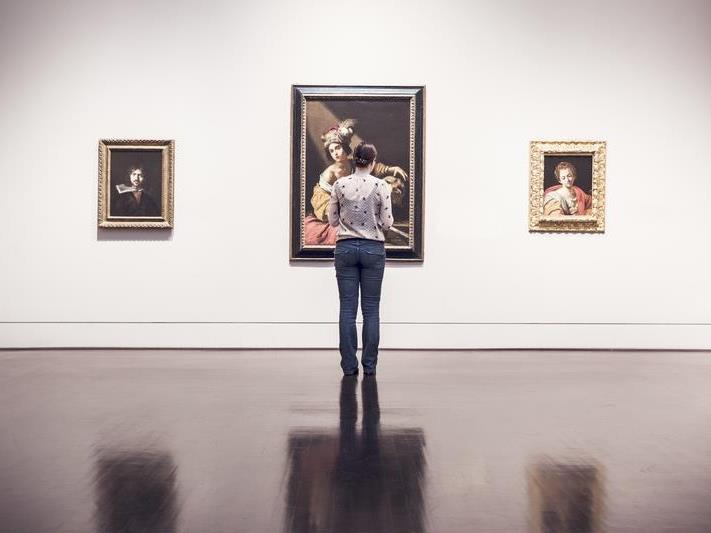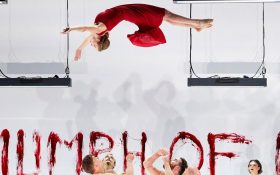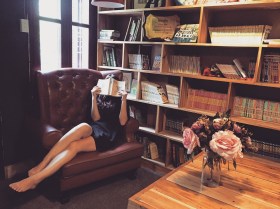Often referred to as ‘post-exhibition blues’ feeling down after reaching a creative milestone is a common experience for artists, writers, performers, and all those arts managers who support them. We delve into why it occurs and uncover strategies to deal with feeling the blues.
1. Accept that it’s normal
Similar to other life milestones such as traveling or getting married, there can be a lull period when the show is finally over. Setting high expectations combined with experiencing a dip in adrenalin and feeling at a lost as to ‘what’s next’ means that post-show blues is a normal response for many.
Illustrator, painter and sign writer Billie Justice Thomson recently experienced a lull after her first solo show at Modern Times. ‘You create this momentum within your routine that is so focused on the goal of getting the work out there that it leaves you with a gap in your life that is difficult to fill.’
Exhaustion also plays a part in spurring on the post-show blues. ‘There can be a lot of sleep deprivation and that puts you into a strange, critical headspace and after it is all done it can leave you a bit confused or unsure about the next chapter,’ said Thomson.
Performer Peter Cook, who is currently playing Imre in The Chain Bridge at The Street in Canberra likens the blues to coming down after a sustained high. ‘I think if you are truly invested in the work you will experience an element of post-project blues.
‘It is a 24/7 commitment and as an actor you are required to give all of yourself, physically, emotionally and mentally every night. This kind of commitment to your work over a sustained period of time will always have an effect on you as an artist and as a person.
Performer Kasia Kaczmarek finds that she is grumpy, on edge, and pessimistic when experiencing post-show blues.
‘It usually takes a week or so for me to attribute my mood to the fact that I’ve just finished a project. I think it happens after both theatre and film gigs, and I felt it particularly strongly after finishing up on a TV series. Knowing that your friends are still going to work every day; that that environment still exists but that your involvement in it is over, can be surprisingly painful.’
2. Understand you are experiencing loss
There are parallels between post-show blues and the experience of grieving. ‘Unless the process has for some reason been a very unpleasant experience, I undergo some sense of loss after every show. There is a letting go of the character you have been playing every night, a letting go of the world of the play, a letting go of the relationships you have experienced with an audience over the course of a season and of course you say goodbye to the people you have been working with,’ said Cook.
When artists and arts facilitators put so much of themselves into their work, it makes sense there could be a tendency to feel depleted when it’s all over.
‘Our sense of identity is tied to where we work,’ said Kaczmarek. ‘Most people spend years in a job; building relationships, establishing routines, strengthening their role within a community of people who share their professional interests. For people in the performing arts, this experience is compressed into a few weeks, sometimes a few days, and in order to replicate this sense of community we learn to open ourselves and find our place very quickly and very deeply.’
The nature of arts work can amplify the experience of post-project blues. ‘When a project ends we are severed from this workplace community, and our sense of belonging. It is not dissimilar to how a person may feel after leaving a job of 15 years. It is not an unnatural response, but an amplified one, based on the impermanent nature of our work,’ said Kaczmarek.
Inspired by the phenomenon, artist and illustrator Mark Gerada titled a show Post Exhibition Blues in 2009. Where he used to view the blues as self-indulgent, Gerada now sees how it is reflective of the lack of support for artists. ‘Many of my artist friends would come up to me and talk about their experiences, so it is quite common.’
While Gerada has been able to work on dealing with post-exhibition blues, he says the struggle of making a living as an artist remains a contributing factor in feeling burnout.
‘For me, making money and feeding three mouths is very important so you just start questioning why you are making art; the amount of time it takes and how little we earn, if anything.’
3. Face down the critic within
Writer, broadcaster and author Sian Prior had a ‘good run’ when Shy – a memoir was published, but experienced ‘pre-publication anxiety’ when the draft was initially finished.
‘Shy was a particularly self-revealing and confessional memoir, so there was a huge amount of anxiety about what people would think of me. Would they think I was nuts? Would they think it was too much information? Would a publisher think it could find a readership?
Prior remembers asking her writing mentors, ‘Do you think I’m going to entirely ruin my professional life if I put this book out?’
What we perceive to be mistakes can play on our mind and contribute to post-show blues, said Cook.
‘You may feel like you never quite got it right or had a couple of nights were you felt you were below par, or didn’t speak your mind about something you disagreed about with the director that you ended up regretting,’
For cabaret artist and jazz singer Mama Alto, post-show blues take the form of exhaustion and deep questioning. While the exhaustion passes over time, the questioning is the scary part, said Alto. ‘The mind races: What will I do next? What’s the next step? What’s my next project? Has the work been received favourably?
‘These questions sometimes devolve into unhelpful, overly critical, and unrealistic perspectives. Am I good enough? Was this work good enough? If it was, how on earth can my next work be as good? Am I a fraud?’
4. Learn to anticipate the blues
While she still experiences post-show blues, Thomson has learned to anticipate and prepare for the experience.
‘Now that I have anticipated this void after a show, I’m much better at distracting myself and getting on with other things,’ said Thomson.
‘Brace yourself from feeling a bit flat and be okay about it. Allow yourself to stay in bed all day if you need to,’ said Thomson.
Sometimes we get caught up in how the work will sell, or what will happen in the future, which only exacerbates feelings of anxiety or worthlessness. Putting focus back on the process, the work, and your accomplishments can help shake us of the blues.
‘Try and focus on feeling proud that you actually finished this thing. Try not to think too much about the future, just focus on the fact that you’ve done an incredibly difficult thing which is to complete a first draft of a book and that is something to open the champagne about,’ said Prior.
‘What comes later is sort of out of your control in a way, so focus on rewarding yourself for the things that have been in your control which is getting to the finish line.’
5. Take a break
It can be healthy thing to experience the blues as it allows you to process the experience. ‘You’re on an anticlimax, you’ve used up all your energy reserves, you’ve been on a creative high, and your stress levels have been elevated. And now it’s all released,’ said Alto.
‘But the first step is to acknowledge you have the blues, acknowledge that you’re exhausted, acknowledge that you need to be gentle with yourself, and accept that this will happen, does happen, and is happening. Struggling against that acceptance will only make your rut feel worse!’
Community arts facilitator and artist Miriam Pickard said that without fail, she will experience ‘post-project exhaustion.’
Give yourself permission to completely disengage, said Pickard. ‘I now know that I have to give myself an unlimited amount of freedom to disconnect from the project so I can reengage with it in a much more healthy and constructive way.
‘It’s taken me a long time to learn, but that exhaustion is a really important thing to respect and to create space for. I think it is an important part of the process.’
In the lead up to an exhibition, tour or project, the everyday details of life tend to take a backseat. Friends, family, trips to the supermarket can be neglected.
Thomson has learned not to feel guilty about taking a break to catch up on basic things – see friends, do some life admin and cook yourself meals instead of getting takeaway.
Cook is already planning ahead to give himself some time off after The Chain Bridge. ‘I think you absolutely need to plan at least a few days of “me” time – or weeks or months depending on the length of the run – just to rest and kind of re-enter the world.
‘But everyone is different. Some people can walk away from a show and not think about it, others take quite a while to recover. Experience will be your best guide,’ he added.
6. Start thinking about the next project
If Netflix in bed doesn’t appeal, throwing yourself into a new project can help to wean feelings of anxiety or blues.
Prior dealt with pre-publication anxiety by working even harder and distracted herself by finishing her PhD, but you can also take it slow.
‘Getting back to business gets harder the longer you put it off, so start gently,’ said Alto. ‘Brainstorm new projects. Jot down notes. Make sketches. Compile a to do list. Wash your underwear. We’re not looking to reinvent the wheel here, just something small to gradually build yourself up again so that you don’t fall into a rut.
‘It’s all about balance. A balance between me-time and community, so that you’re neither isolated nor overwhelmed. A balance between productivity and creativity, so that you’re meeting your goals but not compromising your art. A balance between work and play, so that your spirit can soar,’ said Alto.
7. Look after yourself
Cook is using The Chain Bridge as a template to really test what he needs to do in order to take care of himself throughout rehearsal and performance.
‘I think really basic things like eating well, sleeping properly, not partying too much and paying attention to your body is a good starting point. If you are feeling good physically it will manifest into other areas.
‘It is easy to fall into the trap of having a drink after every show, and partying on your days off but as I approach 40 I am becoming more and more aware of the importance of taking care of yourself,’ he said.
You also need to make the most of downtime. ‘You are working hard, rehearsing during the day, doing lines at night and on weekends so you need to make the most of your downtime…’ said Cook.
Don’t underestimate sleep, said Kaczmarek. ‘It’s very boring, but there is so much new research about the importance of sleep, and going to sleep before 11pm, that it’s now almost ridiculous to ignore it. Unfortunately artists are usually forced to because of the nature of our work, but I try to make sure that when I’m ‘resting’ (i.e. not in work) I get enough sleep.
‘That and regular exercise, minimal sugar and mindfulness. These are not exciting quick-fixes but after many years of medication and self-help books I can truly say these work better than anything else,’ added Kaczmarek.
8. Don’t forget to celebrate the achievement
As a writing mentor, Prior gets her students to compose a letter of congratulations to their future self for when they finish their first draft.
Before you take on a new project, prepare work for an exhibition or start to fill the blank page with your novel, jot down thoughts about how you think you’ll feel when it’s accomplished.
‘It reminds you of how far you’ve come,’ concluded Prior.
There is always the revealing question of asking yourself what feels worse: post-exhibition blues, or not making or engaging with art at all? ‘If you’re driven to be an artist, I think if you didn’t do it, you would likely be more down. If you’re driven to make art you should do it,’ concluded Gerada.





